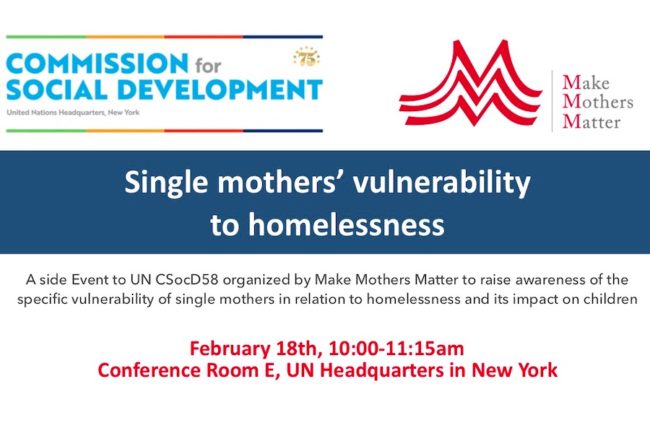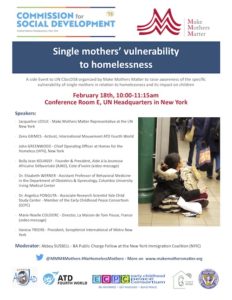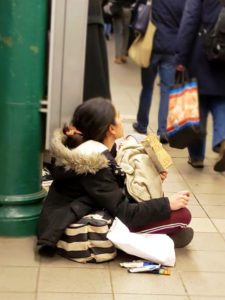Invitation – CSocD58 Side-event on single mothers and homelessness
17.02.20
UN New York, Commission on Social Development - to raise awareness of the specific vulnerability of single mothers in relation to homelessness and its impact on children.

You are cordially invited to join us at the side-event that Make Mothers Matter will hold on 18 February at the UN headquarters in New York on the margins of the 58th UN Commission on Social Development (CSocD58). The priority theme of this session is “Affordable housing and social protection systems for all to address homelessness”,
 Our side-event will focus on the vulnerability of single mothers to homelessness and its impact on children – See practical information on the event flyer. The event will also be broadcast live on our Facebook page. You can also participate in the discussion on twitter @MMM4Mothers #NoHomelessMothers
Our side-event will focus on the vulnerability of single mothers to homelessness and its impact on children – See practical information on the event flyer. The event will also be broadcast live on our Facebook page. You can also participate in the discussion on twitter @MMM4Mothers #NoHomelessMothers
Flyer of the MMM CSocD58 side-event
Why focus on single mothers in relation to homelessness?
The number of single mother families has increased over the past few years. According to the 2019 UN Women report “Families in a changing world”, globally lone parent families represent 8% of all households, 84.3% of which being lone mother families. Single parents, especially single mothers, are particularly vulnerable to poverty and homelessness – even more so as they face intersectional discrimination linked to race, migrant status, disability or other when accessing housing and/or employment.
Single motherhood can have many causes: widowhood, divorce or separation from a partner or spouse, fleeing domestic violence, unintended pregnancies, as well as armed conflicts, natural disasters, displacement and migration, which can separate families. Although an increasing number of women do choose to have children on their own, especially in developed countries, they remain a minority. In the majority of cases, women do not become single mothers by choice. Domestic violence combined with poverty/financial dependence is one of the main drivers of homelessness of single mothers.
Dire statistics

In the subway in New York – February 2020
Although the reality of families is diverse and eludes generalizations, statistics do show that single parent households are more vulnerable to poverty, and therefore disproportionately affected by the lack of affordable housing.
In the EU, 47% of single parent households were at risk of poverty or social exclusion in 2017, compared with 21% of two-parent households – And the majority of single parents are single mothers.
In the UK, according to estimates by Shelter Charities reported in a BBC article, one in every 55 single parent families became homeless in 2017-18. In 92% of these 26,610 cases, the homeless parent was a single mother. The same source states that homelessness has increased by 169% since 2010, and that single parents and their children were eight times more likely to become homeless than couples with children – with again the “vast majority” being single mothers.
And in France, an increasing number of young mothers (2400 in 2017 – mostly migrant women) have nowhere to go when leaving the hospital after giving birth.
Impact on both mothers and children
Homeless situations can leave permanent trauma on both mothers and children.
In addition to possible trauma associated with becoming a lone mother (like fleeing domestic violence, migration, etc.), lone mothers often suffer from economic precariousness, isolation, social stigmatization, self-deprecation and feeling of being a bad parent. All these sufferings, which can lead to anxiety, depression and other mental health issues, are exacerbated in situations of homelessness. Homeless women are also at increased risk of sexual violence.
In turn, these sufferings negatively impact children, especially babies and very young children, for whom a secure and stable environment is so important for a harmonious development. Homelessness also affects a mother’s ability to provide the nurturing care, which is so important for bonding and early child development. And when they are older, attending school and completing a successful education become a challenge. Homelessness threatens a child’s development to their full potential and can jeopardize their future; it puts children at high risk of poverty and homelessness in their adult lives.
Objectives of the Side-Event
The objectives of this side-event, which will take the form of a panel, are:
- To raise awareness on the specific vulnerabilities of single mothers in relation to homelessness: presentation of the current situation in selected countries and analysis of elements, which put at-risk single mothers and their children (poverty; lack of affordable housing, domestic violence, migration, mental illness, etc.)
- To specifically highlight the impact of homelessness on children, especially very young children, and the long-term costs to society
- To present examples of good practices to prevent and address single parent families’ homelessness – E.g. NGO initiatives and government policies to support single parents and prevent and address homelessness (social assistance, shelters, support for participation in the labour force, etc.) – and to make recommendations to governments.
List of speakers
Moderator:
- Abbey SUSSELL – MPH, BJ, BA Public Charge Fellow at the New York Immigration Coalition (NYIC)
Panelists:
- Jacqueline LEDUC – MUP – Make Mothers Matter Representative at the UN, New York
- Zena GRIMES, Activist – International Mouvement ATD Fourth World – Testimonial
- John GREENWOOD – Chief Operating Officer at Homes for the Homeless (HFH), an affiliate of the Institute for Children, Poverty, and Homelessness in New York City
- Bolly Jean KOUASSY – Founder & President, Aide à la Jeunesse Africaine Défavorisée (AJAD), an MMM associate member based in Cote d’Ivoire (Video message)
- Elizabeth WERNER – PhD Assistant Professor of Behavioral Medicine in the Department of Obstetrics & Gynecology, Columbia University Irving Medical Center; Member of the Perinatal Pathways Lab.
- Angelica PONGUTA – MPH, PhD Associate Research Scientist Yale Child Study Center. Member of the Early Childhood Peace Consortium (ECPC)
- Marie-Noelle COUDERC – Director, La Maison de Tom Pouce, an MMM associate member based in France (Video Message)
- Vanesa TREERS – President, Soroptimist International of Metro New York – Live your dream project
We thank all the participating organisations for their support and collaboration.
The New EU Gender Equality Roadmap : A Call for Inclusion of Mothers
04.03.25
The European Commission’s initiative on a new Gender Equality Roadmap post-2025, marks a significant step forward in addressing gender disparities across the European Union. Make Mothers Matter (MMM
Breaking the Cycle: Gender Equality as a Path to Better Mental Health
18.03.25
The Council of the European Union has taken a decisive step in recognising the vital connection between gender equality and mental health.
Europe Must Listen to Mothers: Our landmark report heads to the European Parliament
28.08.25
On 22 September 2025, the voices of mothers will take centre stage in Brussels. For the first time, Make Mothers Matter (MMM) will present its State of Motherhood in Europe








